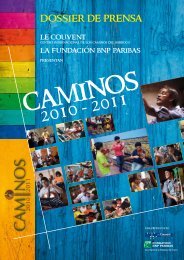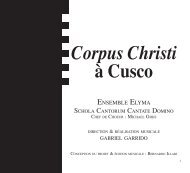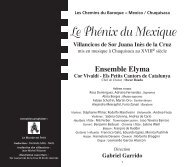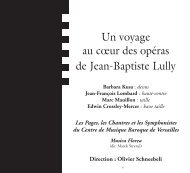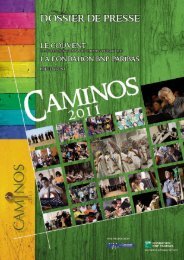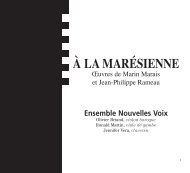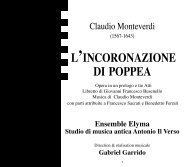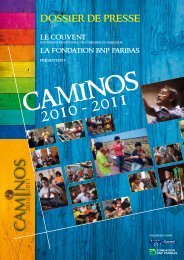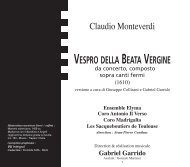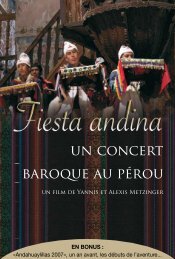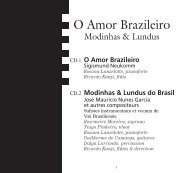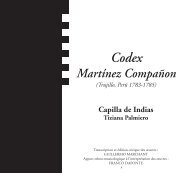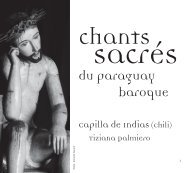Create successful ePaper yourself
Turn your PDF publications into a flip-book with our unique Google optimized e-Paper software.
and Maricarmen Gómez Muntane in 2008. The<br />
former contains six ensaladas, all by Mateu Fletxa ‘le<br />
Vell’, while the latter is a detailed study of the genre<br />
which includes all the ensaladas published by the<br />
younger Fletxa in Prague as well as others of varied<br />
provenance and authorship not featured in that<br />
collection. We should also mention the edition of El<br />
Bon Jorn published by Josep Maria Gregori in 1983,<br />
and other ensaladas and articles on them which have<br />
been issued individually at various times by a number<br />
of authors.<br />
The vision that we interpreters have of this music<br />
in a modern transcription is always an incomplete<br />
one. While one need not go as far as repeating<br />
the old idea of ‘traduttore, traditore’, it is clear<br />
that a transcription always reflects a very personal<br />
conception of the music, a matter of opinion, as one<br />
might say. For this reason, La Colombina has chosen<br />
to work from the Prague print of 1581, which is<br />
very well preserved and perfectly legible, while not<br />
failing to compare this with the sometimes divergent<br />
solutions proposed by the musicologists in their<br />
respective editions. In the case of Pere Alberch Vila’s<br />
La Lucha we have used a transcription by Bernat<br />
Cabré dating from 2007. To put matters simply, let us<br />
say that the main changes we made as performers to<br />
the existing editions concern alterations and musica<br />
ficta, textual underlay, and in some cases metrical and<br />
tempo relationships. We also decided to standardise<br />
the spelling of the composers’ names according to<br />
the norms of what was clearly their native language,<br />
namely Catalan, given that – to take just one<br />
example – one may find Fletxa written, according to<br />
the sources, as Flecha, Fleccia, Flexa, Fleche, Fletscha,<br />
and so forth. However, we make an exception for<br />
musicòlegs Higini Anglès del 1955 i Maricarmen<br />
Gómez Muntané del 2008. La primera comprèn sis<br />
ensalades únicament de Mateu Fletxa “el Vell”, la<br />
segona és un extens treball sobre aquest gènere<br />
i inclou totes les publicades pel nebot Fletxa a<br />
Praga, a banda d’altres ensalades que no figuren<br />
en l’esmentada edició d’autors i orígens diversos.<br />
Cal ressaltar també l’edició que de El Bon Jorn va<br />
publicar el musicòleg Josep Maria Gregori el 1983<br />
com també altres ensalades o articles sobre elles<br />
publicades individualment en moments diversos i<br />
per autors també diversos.<br />
La visió que com a intèrpret es té de la música en<br />
transcripció moderna és sempre parcial. Encara<br />
que no arribi a la antiga idea de traduttore,<br />
traditore, una transcripció sempre reflecteix<br />
una visió personalíssima de la música, un estat<br />
d’opinió per dir-ho d’alguna manera. Per això<br />
hem elegit amb La Colombina el treball a partir<br />
de l’edició impresa a Praga el 1581, en molt bon<br />
estat de conservació i perfectament llegible, sense<br />
oblidar d’acarar-lo amb les solucions, de vegades<br />
diferents, que proposen els musicòlegs a les seves<br />
edicions, i en el cas de La Lucha de Pere Alberch<br />
Vila hem emprat una transcripció de 2007 del<br />
musicòleg Bernat Cabré. Per simplificar direm que<br />
els principals canvis fets com a intèrprets sobre les<br />
edicions existents tenen a veure amb les alteracions<br />
i música ficta, col·locació del text i en algun cas<br />
amb proporcions de compàs i tempo. Hem decidit<br />
igualment normalitzar la grafia dels noms dels<br />
autors d’acord amb la que va ser, certament, la seva<br />
llengua materna, el català, prenent en consideració<br />
per citar-ne només un, que a Fletxa el podem<br />
llegir, segons les fonts, com a Flecha, Fleccia, Flexa,<br />
Fleche, Fletscha..... L’excepció a aquest raonament,<br />
41



